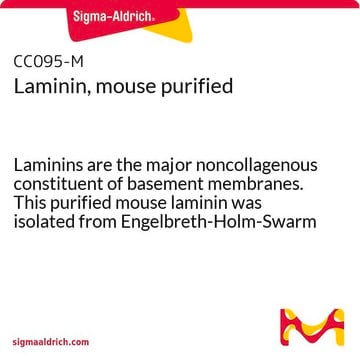11012001
FLO-1 cell line human
Synonyma:
FLO1 Cells
Přihlásitk zobrazení cen stanovených pro organizaci a smluvních cen
About This Item
UNSPSC Code:
41106514
Doporučené produkty
biological source
human esophagus
growth mode
Adherent
karyotype
Not specified
morphology
Epithelial
products
P53 mutation c.830G>T
receptors
Not specified
technique(s)
cell culture | mammalian: suitable
relevant disease(s)
cancer
shipped in
dry ice
storage temp.
−196°C
Cell Line Origin
Distal oesophageal adenocarcinoma
Application
For complete product information, please see ECACC
DNA Profile
STR-PCR Data: Amelogenin: X
CSF1PO: 11
D13S317: 11
D16S539: 12,13
D5S818: 12,14
D7S820: 8
THO1: 6
TPOX: 9,11
vWA: 16
CSF1PO: 11
D13S317: 11
D16S539: 12,13
D5S818: 12,14
D7S820: 8
THO1: 6
TPOX: 9,11
vWA: 16
Culture Medium
DMEM + 2mM Glutamine + 10% Foetal Bovine Serum (FBS)
Subculture Routine
Split sub-confluent cultures (70-80%) 1:4 to 1:8 i.e. seeding at 1-3 x 10,000 cells/cm2 using 0.25% trypsin or trypsin/EDTA; 5% CO2; 37°C. Saturation density approx 105 cells/cm2.
Other Notes
Additional freight & handling charges may be applicable for Asia-Pacific shipments. Please check with your local Customer Service representative for more information.
Cultures from HPA Culture Collections and supplied by Sigma are for research purposes only. Enquiries regarding the commercial use of a cell line are referred to the depositor of the cell line. Some cell lines have additional special release conditions such as the requirement for a material transfer agreement to be completed by the potential recipient prior to the supply of the cell line. Please view the Terms & Conditions of Supply for more information.
Disclaimer
RESEARCH USE ONLY. This product is regulated in France when intended to be used for scientific purposes, including for import and export activities (Article L 1211-1 paragraph 2 of the Public Health Code). The purchaser (i.e. enduser) is required to obtain an import authorization from the France Ministry of Research referred in the Article L1245-5-1 II. of Public Health Code. By ordering this product, you are confirming that you have obtained the proper import authorization.
Storage Class
10 - Combustible liquids
wgk_germany
WGK 3
flash_point_f
Not applicable
flash_point_c
Not applicable
Osvědčení o analýze (COA)
Vyhledejte osvědčení Osvědčení o analýze (COA) zadáním čísla šarže/dávky těchto produktů. Čísla šarže a dávky lze nalézt na štítku produktu za slovy „Lot“ nebo „Batch“.
Již tento produkt vlastníte?
Dokumenty související s produkty, které jste v minulosti zakoupili, byly za účelem usnadnění shromážděny ve vaší Knihovně dokumentů.
Sarah Derks et al.
Cancer immunology research, 3(10), 1123-1129 (2015-06-18)
Esophageal adenocarcinoma is an increasingly common disease with a dismal 5-year survival rate of 10% to 15%. In the first systematic evaluation of the PD-1 pathway in esophageal adenocarcinoma, we identify expression of PD-L2 in cancer cells in 51.7% of
Mathieu Francois Derouet et al.
PloS one, 9(12), e115589-e115589 (2015-01-01)
Carcinoma of the esophagus has a high case fatality ratio and is now the 6th most common cause of cancer deaths in the world. We previously conducted a study to profile the expression of miRNAs in esophageal adenocarcinoma (EAC) pre
S J Hughes et al.
Cancer research, 57(24), 5571-5578 (1998-01-04)
This study describes Fas (CD95) expression in Barrett's esophagus, adenocarcinomas of the esophagus, and three esophageal adenocarcinoma cell lines. Immunohistochemical analysis of Barrett's esophagus demonstrated cell surface expression of Fas protein. In contrast, 30.5% of esophageal adenocarcinomas examined by immunohistochemical
Jurjen J Boonstra et al.
Journal of the National Cancer Institute, 102(4), 271-274 (2010-01-16)
For decades, hundreds of different human tumor type-specific cell lines have been used in experimental cancer research as models for their respective tumors. The veracity of experimental results for a specific tumor type relies on the correct derivation of the
Náš tým vědeckých pracovníků má zkušenosti ve všech oblastech výzkumu, včetně přírodních věd, materiálových věd, chemické syntézy, chromatografie, analytiky a mnoha dalších..
Obraťte se na technický servis.





